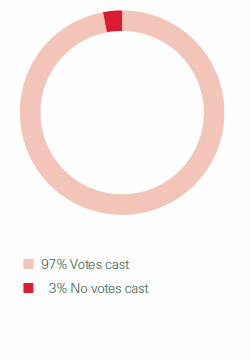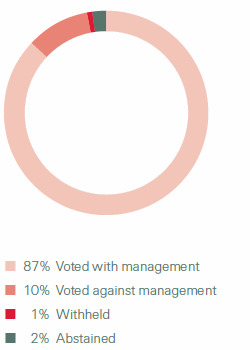Voting
As an asset owner, and in particular as a shareholder, we recognise our rights and responsibilities as an integral part of our commitment to responsible investment.
We believe that ESG considerations, and especially good corporate governance and transparency towards shareholders, are key drivers for sustainable value creation. Last year, in addition to our periodic review, we conducted a thorough analysis of our voting principles to keep them in line with best practice.
In the case of internally managed assets, we use our influence as a responsible shareholder by directly exercising our voting rights, and with externally managed portfolios, by facilitating the relevant portfolio managers to execute our proxy votes and related engagement activities.
In line with our voting framework, we review the voting policies of external managers during due diligence processes to confirm compliance with our own policy. In addition, external managers are required to report on voting activities conducted on Swiss Re’s behalf.
Our voting activities in 2015

Our voting behaviour in 2015

In 2015, we exercised 97% of our voting rights of our listed equity portfolio4. We voted on 6 878 ballots through our external managers. We voted in favour of the respective management resolution in 5 977 cases (87%) and against it in 693 cases (10%). In 208 cases (3%), we abstained or withheld from voting.
In addition to shares in listed companies, investments in our equity portfolio include equity exchange-traded-funds (ETFs). The fund managers cast votes on these ETFs for all investors in accordance with the fund managers’ own voting policies and processes.
Due to our large- and mid-cap company focus and the moderate size of our equity exposure, we generally hold a very small portion of total issued share capital. This means Swiss Re rarely controls the outcome of a vote.
4 We vote in the vast majority of countries, with the exception of a few where voting process and regulatory obligations require a high level of administrative coordination.